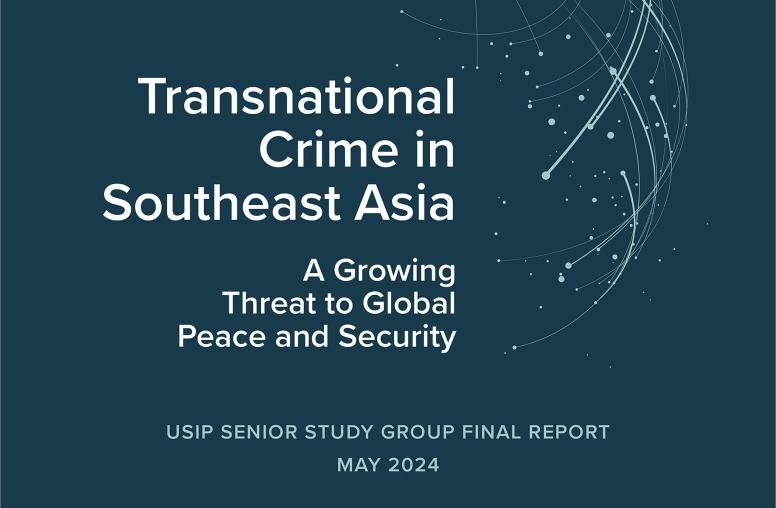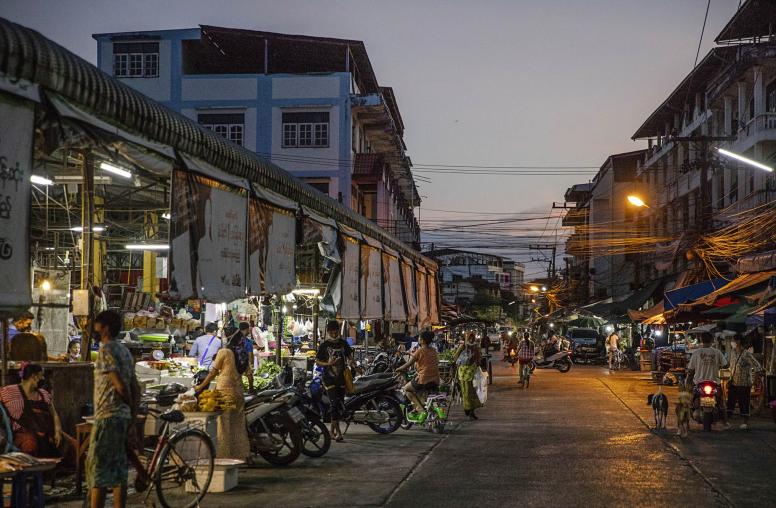USIP Senior Study Group Final Report
Transnational Organized Crime in Southeast Asia
Over the past decade, Southeast Asia has become a major breeding ground for transnational criminal networks emanating from China. USIP assembled a senior study group to assess one of the most pernicious aspects of such criminality: rapidly spreading, industrial-scale scam compounds that rely on forced labor lured from around the world. The senior study group convened four meetings to share research and information on the trends, dimensions and character of the criminal networks operating the scam compounds and developed recommendations for countering their malign effects. In addition, USIP commissioned case studies that examine in detail the influence of the networks in countries across maritime and mainland Southeast Asia.
Organized crime is a significant driver of conflict globally. It preys on and corrupts weak governance and tears at the fabric of societies by empowering and enriching armed actors and fueling violent conflict. Following the COVID pandemic, a web of scam compounds spread across Southeast Asia and, increasingly, other parts of the world.
These scam compounds — which often rely on trafficked and forced labor — partake in a form of scamming known as “pig butchering,” a long-con in which the perpetrator gradually builds trust as a prelude to introducing fraudulent investment opportunities using fake crypto-currency trading platforms that extract devastating financial losses. This scam industry increasingly threatens U.S. national security and could soon rival fentanyl as one of the top dangers that Chinese criminal networks pose to the United States. Last year, U.S. authorities warned Americans of the danger of being trafficked into scam syndicates in Southeast Asia and noted U.S. residents are now the top target of the crime networks’ financial crimes.
The Role of China
China’s role in transnational organized crime is complex. China appears as a key facilitator of network operators — but its people are one of the largest victims and China also stands as a critical arm of law enforcement directed at organized crime.
The Chinese triads connecting the criminal networks reach far back into Chinese history. Meanwhile in recent decades, the shadow of Chinese state-owned enterprises, government agencies and the Communist Party could be seen lurking around the illicit activities.
At the same time, despite this symbiotic relationship, for the past two decades, Chinese police have simultaneously launched crackdowns on overseas Chinese citizens involved in illicit offshore gambling, fraud, money laundering and drug trafficking. These efforts have been adapted to recent scamming operations. The introduction of China’s Global Security Initiative coincided with the internationalization of the pig-butchering scams, offering Chinese law enforcement a ready-made opportunity to dramatically escalate efforts to address criminal activity.
China is certain to continue its campaign against overseas Chinese criminal networks and to trumpet its efforts to protect the Chinese people from trafficking and scams. But it is equally likely that Chinese enforcement will remain selective. This will no doubt incentivize the criminal networks to internationalize their activities more rapidly, putting more citizens from around the world at risk.
U.S. Interests
The criminal networks behind these scams also present a serious threaten to U.S. security interests for several key reasons:
- American citizens are heavily targeted and victimized by transnational organized criminal networks in Southeast Asia to the tune of hundreds of millions of dollars annually.
- The criminal networks behind these scams endanger democracy, good governance and stability around the world by co-opting local elites, undermining law enforcement, weakening state authority, and threatening the U.S. strategic interest of building a free and open Indo-Pacific.
- Criminal networks have taken advantage of weak governance to gain control over territory in countries including Myanmar, Cambodia and Laos, from which they can victimize Americans with near-absolute impunity.
- The Chinese government and Chinese law enforcement, while failing to take this problem seriously for years, are now using the presence of Chinese-led crime groups in other countries to justify striking increases in the presence of China’s authoritarian police around the globe.
The Role of Southeast Asia
Although Myanmar, Cambodia and Laos have become epicenters of online scamming, the criminal networks driving this criminality are embedded across Southeast Asia and the broader Indo-Pacific.
All Southeast Asian nations have histories of local criminal organizations, including those that arise among diaspora groups and ones that emanate from China. Key criminal organizations often operate in more than one country and are associated in various ways with each other.
These organizations follow common patterns of elite capture in host countries. Buying protection from local law enforcement, they move easily between and across countries and employ and enrich local state and non-state armed actors to secure their interests. This has led to the entrenchment of transnational crime (to varying degrees) in social, business and government elites throughout the region and the erosion of governance, law enforcement and business regulation.
The global nature of these organized criminal networks allows them to rapidly respond to crackdowns in any given country or region as they exploit governance gaps between states and operate in grey areas where the reach of law enforcement is restricted by borders. Thus, criminal operators can hopscotch among countries to seek new opportunities while they benefit from an aura of respectability. Thus, constraining transnational criminal networks will require a holistic, international response addressing their causes, effects, power, reach and methods of operation.
Final Report of the USIP Senior Study Group

Transnational Crime in Southeast Asia: A Growing Threat to Global Peace and Security
The Senior Study Group's final report explores the dimensions and nature of Southeast Asia’s China-origin criminal networks and the scourge of online scamming they are now spreading globally.
Study Group Members
Alvin Camba
Assistant Professor, Josef Korbel School of International Studies, University of Denver; Faculty Affiliate, Climate Policy Lab, The Fletcher School, Tufts University
Bridget Welsh
Honorary Research Associate, Asia Research Institute, University of Nottingham Malaysia
Erin West
Deputy District Attorney, REACT Task Force, Office of the District Attorney, Santa Clara County
Jacob Sims
Visiting Expert, U.S. Institute of Peace
Jason Tower
Country Director, Burma, U.S. Institute of Peace
Kristina Amerhauser
Senior Analyst, Global Initiative Against Transnational Organized Crime
Priscilla Clapp
Senior Advisor, U.S. Institute of Peace
Scot Marciel
Former U.S. Ambassador to Myanmar, Indonesia, and ASEAN; Oksenberg-Rohlen Fellow, Stanford University
Sean Turnell
Senior Fellow, Southeast Asia Program, Lowy Institute
Featured Resources

Southeast Asia Web Scams Reach U.S., Setting Off Alarms for Law Enforcement
From their base in ungoverned stretches of Southeast Asia, international criminal networks are prowling the Internet, seeking to defraud victims around the world with sophisticated and psychologically devastating scams.

Transnational Organized Crime in Southeast Asia
On May 13, USIP hosted a conversation on these rapidly spreading, industrial-scale scam compounds in Southeast Asia. Drawing from USIP’s recent senior study group report on the topic, the discussion illuminated how far-reaching criminal networks have been able to adapt to regional conditions and escape the constraints of law enforcement — as well as how policymakers can counter their malign effects.

Jason Tower on the Dangerous Proliferation of Scam Compounds in Southeast Asia
Chinese crime syndicates have set up sophisticated online scamming operations throughout Southeast Asia that rake in an estimated $64 billion a year. Relying on forced labor, the scam compounds “look almost like penal colonies,” says USIP’s Jason Tower, adding: “This is happening on an industrial scale.”

China’s Influence Increases amid Myanmar’s Instability
Operation 1027 in Myanmar’s northern Shan State has advanced China’s quest to eradicate forced labor scam compounds on its border. However, it has also disrupted the lucrative China-Myanmar border trade and triggered a countrywide attack by resistance forces that has dealt the junta unprecedented battlefield losses.

A Criminal Cancer Spreads in Southeast Asia
In the fractured authority surrounding crime-group controlled enclaves on the Moei River separating Thailand and Myanmar, this is what a crackdown on armed gangsters looks like: China presses Myanmar’s military junta — a sometimes client of Beijing — to make Thailand cut electric power to a large gambling and fraud hub run by Chinese crime syndicates across the river in Myanmar.

Myanmar’s Criminal Zones: A Growing Threat to Global Security
International media and law enforcement are waking up to a new post-COVID trend in transnational crime: the proliferation of criminally run zones in Myanmar and across Southeast Asia, and an explosion of human trafficking for labor in these ungoverned enclaves.

Myanmar Regional Crime Webs Enjoy Post-Coup Resurgence: The Kokang Story
Following the coup by the Myanmar army on February 1, 2021, fighting exploded immediately in the China-Myanmar border area along a strategic trade route between the two countries. But the outbreak wasn’t about the coup — instead it was a battle between two Chinese-speaking militias over control of the Kokang Special Administrative Zone, a lucrative center for illegal business.

Chaos Sparked by Myanmar Coup Fuels Chinese Cross-border Crime
Myanmar has once again become a magnet for transnational criminal groups. Conditions that make legitimate business nearly impossible — economic collapse, deteriorating rule of law and spreading chaos — are fertile ground for organized criminals, and they are returning to Myanmar in force after a brief crackdown by the country’s now-deposed civilian government.